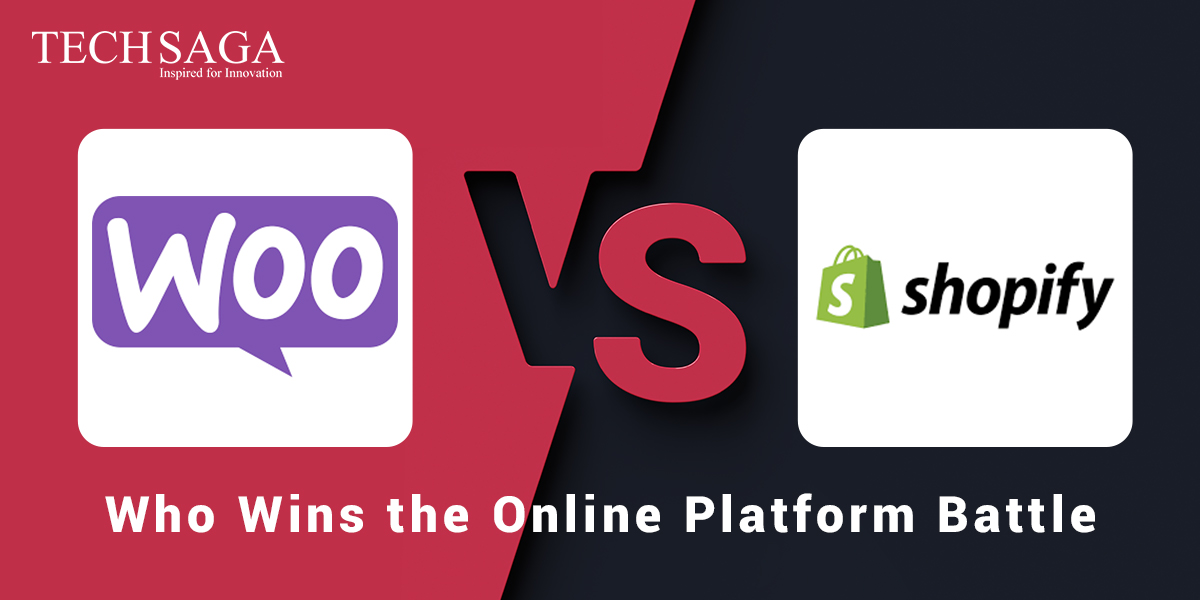Team Techsaga
Gain valuable insights and stay updated with the latest innovations through our engaging blog. Explore trends, technology advancements, and expert opinions to navigate the ever-evolving world of IT.
WooCommerce vs Shopify: Who Wins the Online Platform Battle?
In the bustling arena of e-commerce, two heavyweight contenders stand tall: WooCommerce and Shopify. These platforms have revolutionized the way businesses sell their products online, offering robust features and intuitive interfaces that cater to the diverse needs of merchants worldwide. But when it comes down to the ultimate showdown, who emerges victorious? Shopify and Woocommerce developers in India are easily available.
WooCommerce, with its unparalleled customization and scalability, empowers merchants with full control. Meanwhile, Shopify’s seamless setup and comprehensive features provide an all-in-one solution. The battle for e-commerce dominance continues, with the victor ultimately determined by the specific needs and preferences of each individual business. Let’s delve into the strengths and weaknesses of each to find out.
WooCommerce: The WordPress Powerhouse:
WooCommerce, a dynamic open-source e-commerce plugin seamlessly integrated with WordPress, commands a vast user community drawn to its unmatched versatility. With an array of customizable features and extensive plugin support, it empowers businesses to tailor their online stores precisely to their unique needs, fostering growth and innovation in the digital marketplace. Here’s where it shines:
Customization-
Your online store’s layout and features are entirely customizable with WooCommerce. Leveraging the power of WordPress, users can tap into a vast ecosystem of themes and plugins to tailor their store to perfection.
Scalability-
Whether you’re a small boutique or a large enterprise, WooCommerce scales effortlessly to accommodate your growing business needs. Its modular architecture allows for seamless integration with various extensions, enabling you to add new features as your business evolves.
Cost-effectiveness-
Since WooCommerce is free to use, it’s an attractive option for budget-conscious entrepreneurs. However, keep in mind that you’ll incur expenses for hosting, themes, and premium plugins, which can add up over time.
Ownership and Control-
One of WooCommerce’s biggest advantages is that it’s self-hosted, meaning you have full ownership and control over your data. This level of autonomy appeals to businesses wary of vendor lock-in and third-party dependencies. When you hire woocommerce developer in India, you can avail all of these benefits.
Despite its strengths, WooCommerce isn’t without its drawbacks.
Drawbacks:
Technical Expertise Required-
Setting up and maintaining a WooCommerce store can be challenging for users without technical knowledge. Customization and troubleshooting may require familiarity with coding and web development.
Hosting Costs-
While WooCommerce itself is free, users must pay for web hosting, domain registration, security measures, and other essential services. These costs can add up, especially for businesses with high traffic or complex needs.
Security Concerns-
As a self-hosted platform, WooCommerce puts the onus of security on the user. Without proper measures in place, such as regular updates and security plugins, websites may be vulnerable to cyber threats and attacks.
Dependency on Third-Party Extensions-
While WooCommerce offers a wide range of extensions and plugins to enhance functionality, relying heavily on third-party solutions can introduce compatibility issues, performance issues, or even conflicts with future updates.
Support Limitations-
While WooCommerce has a supportive community and documentation, obtaining timely and comprehensive support for complex issues may be challenging compared to fully managed platforms like Shopify, which offer dedicated customer support teams.
Shopify: The All-in-One Solution:
Shopify stands as a fully hosted e-commerce platform, offering businesses of all sizes a comprehensive solution for online retail. With its user-friendly interface and extensive built-in features, Shopify simplifies the process of setting up and managing an online store, allowing merchants to focus on growing their business with confidence. Here’s why one should hire Shopify developers India:
Ease of Use-
Shopify prides itself on its user-friendly interface, making it incredibly easy for even novice users to set up and manage their online stores. From product listings to order management, everything is streamlined for maximum efficiency.
Built-in Features-
Shopify comes packed with a wide range of built-in features, including secure payment processing, customizable themes, and comprehensive analytics. This all-in-one approach simplifies the e-commerce experience, saving merchants time and effort.
Scalability and Reliability-
With Shopify, scalability is never an issue. Whether you’re experiencing a sudden surge in traffic or expanding your product catalog, Shopify’s robust infrastructure can handle it with ease. Plus, since it’s a hosted solution, you don’t have to worry about server maintenance or security updates.
24/7 Support-
Shopify offers round-the-clock customer support via phone, email, and live chat, ensuring that help is always just a click away. This level of support is invaluable for businesses navigating the complexities of online selling.
However, Shopify’s convenience comes at a price. While it offers a range of pricing plans to suit different budgets, ongoing subscription fees can add up over time. Additionally, since Shopify is a hosted solution, you have less control over your store’s backend compared to WooCommerce.
Drawbacks of Shopify:
Monthly Costs-
Shopify’s subscription fees can accumulate over time, particularly for businesses on higher-tier plans or those requiring additional features and add-ons.
Transaction Fees-
Beyond subscription costs, Shopify charges transaction fees for each sale made through external payment gateways if merchants don’t use Shopify Payments.
Customization Limitations-
Despite a range of customizable themes and apps, merchants may find Shopify’s design and functionality constraints limiting, particularly for highly unique or complex store requirements.
Dependency on Shopify’s Ecosystem-
Users rely heavily on Shopify’s ecosystem for support, updates, and integrations, making them vulnerable to any changes or disruptions in the platform’s services.
Limited Control Over Data-
Shopify’s fully hosted nature means merchants have less control over their store’s backend and data compared to self-hosted solutions like WooCommerce, potentially raising concerns about data privacy and ownership.
Read Also:- How Digital Marketing and Advertising Can Help Grow Your E-commerce Business
The Verdict: It Depends on Your Needs:
So, who emerges victorious in the WooCommerce vs. Shopify showdown? The truth is, it depends on your unique requirements and preferences.
- Choose WooCommerce if you prioritize customization, scalability, and ownership over your store’s data.
- Opt for Shopify if you value ease of use, built-in features, and reliable support.
Both platforms have their strengths and weaknesses, but ultimately, the winner is the one that best aligns with your business goals and resources. Whether you’re a small startup or a thriving enterprise, there’s a perfect e-commerce solution out there waiting for you.
TechSaga Corporations stands as a premier provider of e-commerce development services, specializing in crafting exceptional online stores on platforms like WooCommerce and Shopify. Hire best Shopify Developers in India and avail yourself of the expert team that combines technical prowess with creative innovation. We always adhere to delivering tailored solutions that elevate your online presence and drive business growth.
TAG: WooCommerce

